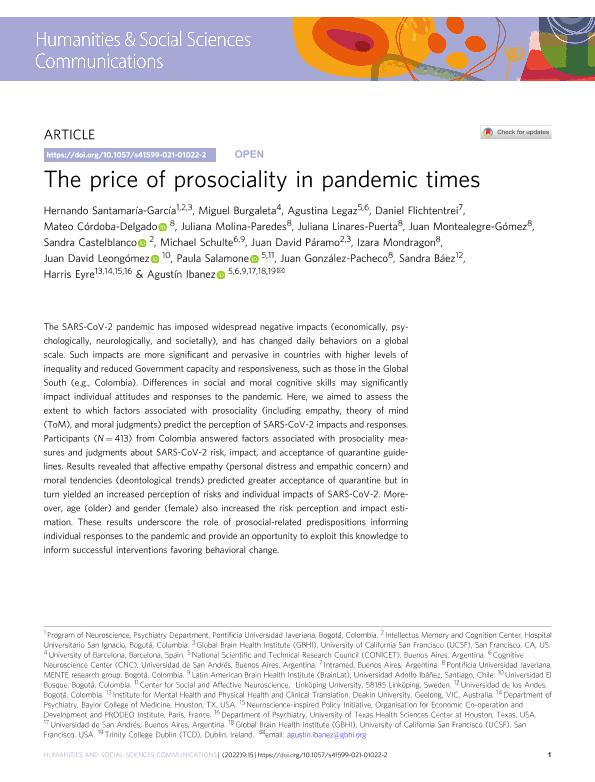Artículo
The price of prosociality in pandemic times
Santamaria Garcia, Hernando ; Burgaleta, Miguel; Legaz, Agustina
; Burgaleta, Miguel; Legaz, Agustina ; Flichtentrei, Daniel; Córdoba Delgado, Mateo; Molina Paredes, Juliana; Linares Puerta, Juliana; Montealegre Gómez, Juan; Castelblanco, Sandra; Schulte, Michael; Páramo, Juan David; Mondragon, Izara; Leongómez, Juan David; Salamone, Paula Celeste
; Flichtentrei, Daniel; Córdoba Delgado, Mateo; Molina Paredes, Juliana; Linares Puerta, Juliana; Montealegre Gómez, Juan; Castelblanco, Sandra; Schulte, Michael; Páramo, Juan David; Mondragon, Izara; Leongómez, Juan David; Salamone, Paula Celeste ; González Pacheco, Juan; Báez, Sandra; Eyre, Harris; Ibañez, Agustin Mariano
; González Pacheco, Juan; Báez, Sandra; Eyre, Harris; Ibañez, Agustin Mariano
 ; Burgaleta, Miguel; Legaz, Agustina
; Burgaleta, Miguel; Legaz, Agustina ; Flichtentrei, Daniel; Córdoba Delgado, Mateo; Molina Paredes, Juliana; Linares Puerta, Juliana; Montealegre Gómez, Juan; Castelblanco, Sandra; Schulte, Michael; Páramo, Juan David; Mondragon, Izara; Leongómez, Juan David; Salamone, Paula Celeste
; Flichtentrei, Daniel; Córdoba Delgado, Mateo; Molina Paredes, Juliana; Linares Puerta, Juliana; Montealegre Gómez, Juan; Castelblanco, Sandra; Schulte, Michael; Páramo, Juan David; Mondragon, Izara; Leongómez, Juan David; Salamone, Paula Celeste ; González Pacheco, Juan; Báez, Sandra; Eyre, Harris; Ibañez, Agustin Mariano
; González Pacheco, Juan; Báez, Sandra; Eyre, Harris; Ibañez, Agustin Mariano
Fecha de publicación:
12/2022
Editorial:
Springer
Revista:
Humanities and Social Sciences Communications
ISSN:
2662-9992
Idioma:
Inglés
Tipo de recurso:
Artículo publicado
Clasificación temática:
Resumen
The SARS-CoV-2 pandemic has imposed widespread negative impacts (economically, psychologically, neurologically, and societally), and has changed daily behaviors on a global scale. Such impacts are more significant and pervasive in countries with higher levels of inequality and reduced Government capacity and responsiveness, such as those in the Global South (e.g., Colombia). Differences in social and moral cognitive skills may significantly impact individual attitudes and responses to the pandemic. Here, we aimed to assess the extent to which factors associated with prosociality (including empathy, theory of mind (ToM), and moral judgments) predict the perception of SARS-CoV-2 impacts and responses. Participants (N = 413) from Colombia answered factors associated with prosociality measures and judgments about SARS-CoV-2 risk, impact, and acceptance of quarantine guidelines. Results revealed that affective empathy (personal distress and empathic concern) and moral tendencies (deontological trends) predicted greater acceptance of quarantine but in turn yielded an increased perception of risks and individual impacts of SARS-CoV-2. Moreover, age (older) and gender (female) also increased the risk perception and impact estimation. These results underscore the role of prosocial-related predispositions informing individual responses to the pandemic and provide an opportunity to exploit this knowledge to inform successful interventions favoring behavioral change.
Palabras clave:
prosociality
,
social cognition
,
moral
,
COVID-19
Archivos asociados
Licencia
Identificadores
Colecciones
Articulos(SEDE CENTRAL)
Articulos de SEDE CENTRAL
Articulos de SEDE CENTRAL
Citación
Santamaria Garcia, Hernando; Burgaleta, Miguel; Legaz, Agustina; Flichtentrei, Daniel; Córdoba Delgado, Mateo; et al.; The price of prosociality in pandemic times; Springer; Humanities and Social Sciences Communications; 9; 1; 12-2022; 1-12
Compartir
Altmétricas



